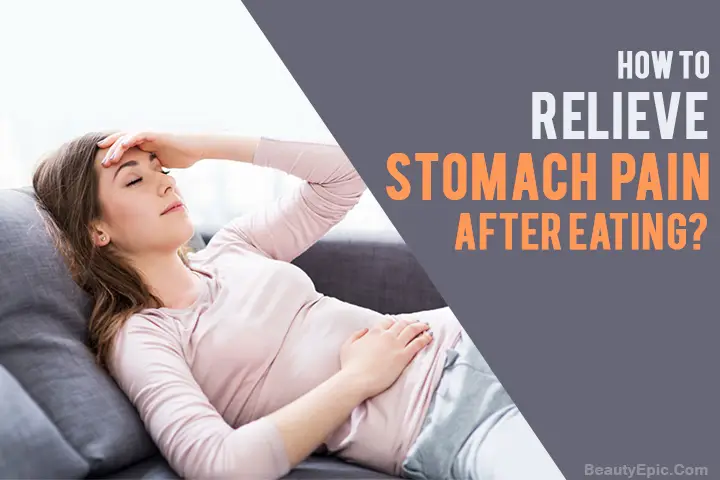
Important: This article is for informational purposes only. Please read our full disclaimer for more details.
Stomach pain after eating is a common condition that affects both adults and children. It is characterized by mild to severe pain in the right or left side of one’s abdomen. This pain doesn’t begin immediately after eating. Its incubation period after eating may vary from a couple of minutes to hours. Read on for a more detailed discussion on the symptoms, causes, remedies and prevention of this condition.
What are the Symptoms of Abdominal Pain?
The major symptoms of this condition include:
- Fever
- Abdominal swelling
- Constipation
- Indigestion
- Vomiting
- Abdominal tenderness
- Diarrhea
- Intestinal dysmotility
- Blood in stools
- Nausea
What Causes of Stomach Pain After Eating?
1. Combining Meals with Liquids
Most people often like to flush down their meals with beer or coke. This is a major cause of several stomach problems. If you take any fluid in abundance, be it water, coke or even fresh juice, it can interfere with the normal functioning of your stomach. These fluids will dilute digestive acids and juices secreted by your stomach to break down food molecules. Consequently, the stomach will be forced to overwork to break down the molecules. This includes churning or ejecting the food, which eventually results in vomiting or stomach cramps.
2. Parasites
There are several parasites which make the stomach their abode. They can induce some chronic digestive disorders. Besides stomach ache after eating, if you also experience diarrhea, then it is definitely a parasitic infestation.
3. Candida
The growth of candida in the stomach tends to kill the ‘good’ bacteria, which helps in digestion. Moreover, it also disrupts enzyme production, and decreases the amount of acid and bile in the stomach. Candida infection can completely overturn the functioning of your digestive system. Besides stomach pain, candida may cause many other discomforts.
4. Exercising

Working out immediately after eating is a major cause of stomach pain. Some fitness lovers just cannot wait to engage in rigorous workouts immediately after having a heavy meal.
5. Blockage of the Blood Vessels
After meals, the blood supply to the intestinal tract tends to increase, which can impose pressure on your blood vessels. Consequently, a few vessels may get blocked, leading to a condition known as ‘chronic mesenteric insufficiency’. Sometimes the pain can be so severe that you are scared of eating.
6. Gastric Cancer
This is certainly the most serious cause of stomach pain. It can only be confirmed by a gastroenterologist after undergoing an endoscopy.
7. Gallstones
Gallstones are pebble-like substances obstructing bile flow in your bile duct. The stomach requires bile to digest fatty foods. Formation of gallstones causes excruciating stomach pain, which can last for several hours.
8. Acid Reflux
Besides stomach ache after eating, acid reflux can lead to many other issues such as heartburn, vomiting, difficulty in swallowing and nausea.
How Can you Relieve Stomach Pain after Eating?

While you should bring to your doctor’s notice severe, prolonged stomach pain, mild ache can be treated by the following home remedies:
- Eating asafoetida can help relieve stomach pain immediately. Prepare the asafoetida by roasting it on low flame before mixing with yogurt.
- Add a tablespoon of fennel seeds to a glass of hot water, then drink the solution when lukewarm.
- Drink plenty of water or other fluids to keep your body hydrated.
- Adding ginger and honey to hot water and drinking it can help fight nausea.
- You can take an antacid to help you alleviate acidity.
What Preventive Measures Can you Take to Avoid this Condition?
Here are some tips on how to avoid stomach ache after meals:
- Avoid the intake of unhealthy food items such as packaged foods, fast foods, and very oily foods.
- Stick to regular meal timings. Never skip breakfast, and try to have lunch and dinner on time.
- Do not sleep immediately after eating. Rather, it is advisable take a walk or sit down to relax after having a meal.
- Avoid overeating. Rather, eat your food in small quantities but frequently. So instead of eating three large meals every day, you can have five smaller ones during the day.
- Consume fluids in small quantities after having your meals.
Stomach pain after eating may be a symptom of some underlying health ailments. In case you don’t feel any improvement after using these home remedies, seek medical help immediately.
You Might Also Like:
- Top 10 Gastroenterologists in Hyderabad
- Why Do You Feel Pooping In The Stomach
- Does Apple Cider Vinegar Cure Acid Reflux
- Does Baking Soda Helps Acid Reflux
- How To Use Aloe Vera For Acid Reflux?
- 10 Foods That Help Relieve Vomiting
Image:- 1















